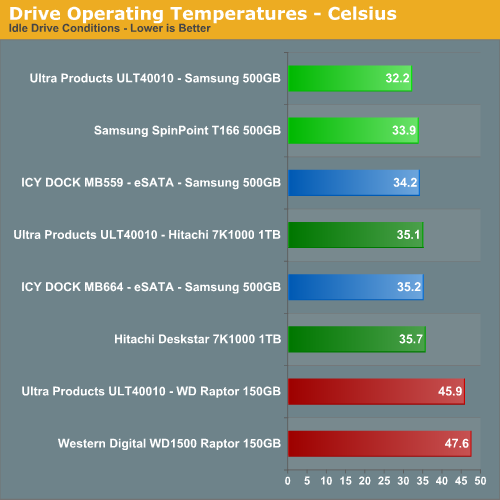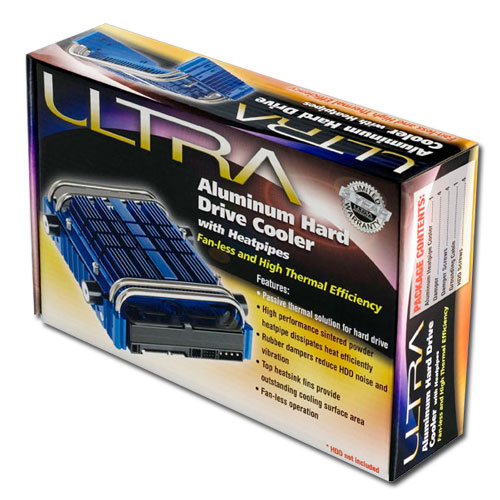Test Results


Clearly, the Ultra Products ULT40010 provides superior heat dissipation compared to a bare drive in a standard 3.5" HD case mount. Our Samsung drive, already having earned its reputation as one of the coolest hard drives to grace our test labs, not only runs almost two degrees cooler when mounted using the ULT40010, but it also takes longer to reach this peak temperature. Out of curiosity, we worked the hard drive out in a long (30GB) archive process to see if we could make the heat climb any further, and were only successful in reaching a maximum threshold of one degree higher (43C). The additional surface area of the Ultra cooler (with its cooling fins and heat pipes) allows sufficient thermal transfer to make a noticeable difference, even in our relatively cool-running Samsung drive.
The results were even better with our Hitachi 7K1000 and Western Digital Raptor drives. Idle temperatures on the Hitachi drive only dropped about 1%, but load temperatures dropped over 5% in our test system. The 150GB Raptor has the highest idle and operating temperatures of any hard drive in our labs. As such, this is the drive that would tell us just how well the ULT40010 is designed as a passive cooling unit. We were not disappointed as idle temps dropped 3% and load temperatures decreased over 7%. Once again we ran our 30GB archive test and temperatures did not vary more than 1% over the course of several archive sessions.
Conclusion

Ultra also advertises that the cooler will reduce noise compared to a standard test setup, but we were unable to discern any difference in our test bed. Presumably, Ultra's claim refers to the rubber mount contacts that reduce case vibration compared to cheaper PC cases that use steel-only hard drive housings. While this claim is certainly true, there has been a trend in the midrange to high-end PC cases to have some type of rubber or foam in place wherever storage devices will contact the case chassis. Given the MSRP of $43 for the ULT40010, it stands to reason that anyone looking at this cooler as an option already has a good quality case with vibration dampening hardware inside. While this does potentially remove one of the items in Ultra's favor, it doesn't take away from the fact that the ULT40010 performs well as a passive hard drive cooler, which is its primary selling point.
The Ultra cooler does what it says, but it doesn't perform miracles. Good active cooling solutions tend to perform better than good passive cooling solutions. While this cooler is indeed an example of a very good passive cooling solution, it does mean that it has somewhat less impact than it likely could if it had (for example) a fan mounted on the top. The trade-off, however, is well worth it to users looking for a case that runs as close to silently as possible. For that reason, Ultra Product's ULT40010 hard drive cooler is an excellent choice for HTPC users, and anyone seeking to help mitigate a hard drive heat problem without adding additional noise to their PC configuration.


Clearly, the Ultra Products ULT40010 provides superior heat dissipation compared to a bare drive in a standard 3.5" HD case mount. Our Samsung drive, already having earned its reputation as one of the coolest hard drives to grace our test labs, not only runs almost two degrees cooler when mounted using the ULT40010, but it also takes longer to reach this peak temperature. Out of curiosity, we worked the hard drive out in a long (30GB) archive process to see if we could make the heat climb any further, and were only successful in reaching a maximum threshold of one degree higher (43C). The additional surface area of the Ultra cooler (with its cooling fins and heat pipes) allows sufficient thermal transfer to make a noticeable difference, even in our relatively cool-running Samsung drive.
The results were even better with our Hitachi 7K1000 and Western Digital Raptor drives. Idle temperatures on the Hitachi drive only dropped about 1%, but load temperatures dropped over 5% in our test system. The 150GB Raptor has the highest idle and operating temperatures of any hard drive in our labs. As such, this is the drive that would tell us just how well the ULT40010 is designed as a passive cooling unit. We were not disappointed as idle temps dropped 3% and load temperatures decreased over 7%. Once again we ran our 30GB archive test and temperatures did not vary more than 1% over the course of several archive sessions.
Conclusion

Ultra also advertises that the cooler will reduce noise compared to a standard test setup, but we were unable to discern any difference in our test bed. Presumably, Ultra's claim refers to the rubber mount contacts that reduce case vibration compared to cheaper PC cases that use steel-only hard drive housings. While this claim is certainly true, there has been a trend in the midrange to high-end PC cases to have some type of rubber or foam in place wherever storage devices will contact the case chassis. Given the MSRP of $43 for the ULT40010, it stands to reason that anyone looking at this cooler as an option already has a good quality case with vibration dampening hardware inside. While this does potentially remove one of the items in Ultra's favor, it doesn't take away from the fact that the ULT40010 performs well as a passive hard drive cooler, which is its primary selling point.
The Ultra cooler does what it says, but it doesn't perform miracles. Good active cooling solutions tend to perform better than good passive cooling solutions. While this cooler is indeed an example of a very good passive cooling solution, it does mean that it has somewhat less impact than it likely could if it had (for example) a fan mounted on the top. The trade-off, however, is well worth it to users looking for a case that runs as close to silently as possible. For that reason, Ultra Product's ULT40010 hard drive cooler is an excellent choice for HTPC users, and anyone seeking to help mitigate a hard drive heat problem without adding additional noise to their PC configuration.










31 Comments
View All Comments
casteve - Friday, November 2, 2007 - link
A couple of degrees better performance in the HDD is a don't care improvement.If you've got the space, a low rpm, essentially silent fan only costs $5 and solves the problem.
As a science experiment, it would be interesting to see how much the cooler performance improves over stock with active cooling.